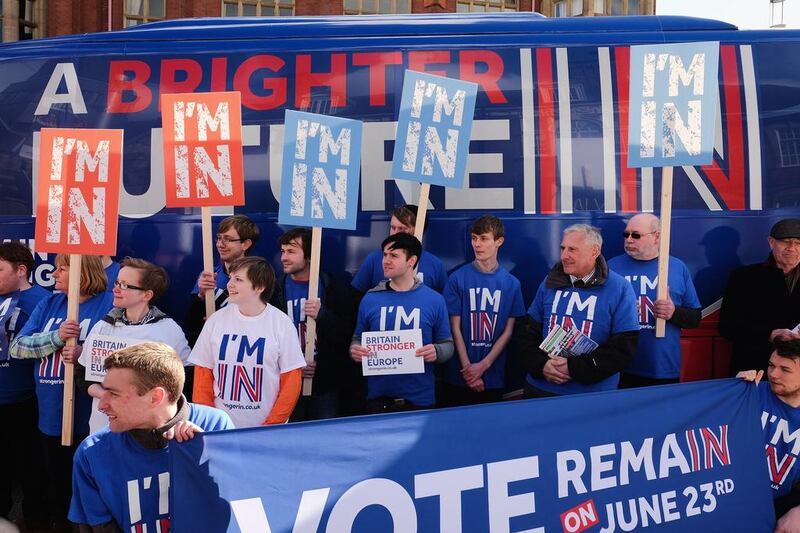The faithful make up more than 3 million of Britain’s population and are a significant economic force. But like their fellow Britons, the community is polarised on Brexit. Labour legislator Naz Shah says the Leave campaign has failed to outline the price of going it alone, but Conservative activist Naheed Majeed argues that it is time for the nation to regain its sovereignty from Brussels.
Naz Shah and Naheed Majeed are British Muslim women with strong stories of rising from unpromising beginnings to succeed in life.
Their backgrounds reveal striking similarities, but also great differences. Now, they find themselves on opposing sides of Britain’s fierce debate on whether to leave the European Union.
Britain votes next month in a referendum that poses a single question: “Should the United Kingdom remain a member of the European Union or leave the European Union?”
Ms Shah, 42, is an opposition Labour legislator passionately behind continued membership.
Ms Majeed, 37, an activist in the governing right-wing Conservative party and former mayoress of the royal borough of Windsor and Maidenhead in Berkshire, is prominent in the Leave lobby and a co-founder of the Muslims for Britain group in favour of Brexit.
According to Ms Shah, EU membership offers security, “in trade, progress and human rights” as well as in countering terrorism. For Ms Majeed, it has proved a disaster that has “crushed our democracy”.
Their sharp differences on the most pressing current issue of British politics, with social and economic implications for the rest of the world, reflect widespread division and uncertainty across the British electorate.
And opinion is as polarised among Britain’s estimated Muslim population of more than 3 million as in any other group.
About three-quarters of that number are thought to be of voting age. Although a majority of British Muslims who vote tend to support Labour in national and local politics, the referendum charts waters untouched since 1975, when 66 per cent of the turnout backed staying in the EU’s predecessor, the European Community, after two years of membership.
Many electors complain that the debate is complicated, with facts harder to find than bald rhetoric. Yet for Ms Shah and Ms Majeed, the issues are clear.
“Beyond the scaremongering, there is absolutely nothing from the Leave campaign to show a blueprint of what things would look like – what it will cost, what will actually happen,” says Ms Shah, who entered parliament in 2015 after triumphing over a wretched start in life.
She was born in the northern city of Bradford, Yorkshire. When she was six, the family was abandoned by her father who ran off with a 16-year-old neighbour. At 12, she was sent to the family’s native Pakistan to shield her from her mother’s abusive new partner.
Her mother later poisoned the stepfather; she claimed he was a violent man who planned to sexually abuse her daughters, but served 14 years of a life sentence for murder. Still in her mid-teens, Ms Shah was forced into marriage to a man who also turned out to be abusive.
She campaigned energetically for her mother’s release and believes she would not have been convicted in today’s judicial climate. She accepts her background as “part of what makes me who and what I am”, but says of the referendum: “My values are Labour’s values and they are consistent with staying in the EU side by side with our fellow Europeans.”
In recent days, Ms Shah has had other things on her mind. Anti-Israeli comments made in 2014, before her election to parliament, resurfaced and she has been suspended from the Labour party, as well as resigning a junior government position, pending further investigation. She denies she was anti-Semitic, saying her comments – including a suggestion that Israeli Jews should be relocated to the United States – reflected strong emotions at a time of conflict in Gaza.
Speaking before the controversy, Ms Majeed, a financial analyst, professed “a lot of respect” for her political adversary. She, too, was born in Yorkshire. Her childhood was also working class, her father having arrived penniless from Kashmir in the late 1950s, but it was relatively comfortable with none of the trauma suffered by Ms Shah.
“The referendum is a historic opportunity to allow Great Britain to regain control of her own destiny,” she says.
“As a second-generation Briton, one of the things I love most about my country is that we choose our own political leaders and get rid of them if we don’t like them. In the EU, we are ruled by outsiders and can influence what happens only as one of 28 member states.”
Ms Majeed urges fellow British Muslims to help stop the country from “being dragged deeper and deeper into European political union”. On both sides of the argument, positions can be blurred. Some pro-Brexit supporters, such as Ms Majeed, resent the presence on their side of far-right politicians. Much of the Stay camp is openly critical of the loss of sovereignty within the EU, and recognises the limitations of concessions won by prime minister David Cameron.
The economic case
Mr Cameron’s business secretary, Sajid Javid, another product of Muslim immigration from the Indian subcontinent, is voting to stay in the face of defiant voices including other ministers and Boris Johnson, London’s mayor – like Mr Javid, a widely tipped contender for future Conservative leadership. But he admits to serious misgivings.
“It’s clear now the UK should never have joined,” Mr Javid, who is not a practising Muslim, says frankly at his own website, reproducing an article he wrote for the Mail on Sunday newspaper.
“In many ways, it’s a failing project, an overblown bureaucracy in need of wide-ranging and urgent reform. Had we never taken the fateful decision to sign up, the UK would still, of course, be a successful country with a strong economy.”
But he insists the question is not about what it should have happened 43 years ago, but about now: “My heart says we are better off out. My head says it’s too risky right now.”
His fellow Conservative Nus Ghani, born in Britain in the year before EU membership began, shares his disenchantment. She will vote to leave, but defies anyone to describe her as a “little Englander” since she calls herself a proud product of immigration, the daughter of a man who “exchanged his Kashmiri headmaster’s cloak for Birmingham biscuit factory overalls”.
“The prime minister has done his best,” she says, “but Brussels was not prepared to give up sufficient control over our sovereignty to make our membership of the EU legitimate. And its dysfunction and disorder make staying as we are the truly risky option.”
Miqdaad Versi, an Oxford-educated management consultant, disagrees, believing that the benefits of remaining far outweigh the bloc’s imperfections.
Mr Versi says Muslims, too, are swayed by “the impact on their wallets”. He cites data showing their importance to Britain’s economy – £34 billion (Dh182.5bn) of Islamic finance issued through the London Stock Exchange, £20.5bn of spending power, businesses creating 70,000 jobs in London alone and a £1bn halal industry.
And on economic issues, he has no doubt where the interest of all Britons lie: “Our net contribution to the EU is less than 0.5 per cent of our GDP, about £340 per household. Yet for this meagre stipend, average households receive benefits worth more than £3,000 through the 3 million UK jobs dependent on trade with the EU, lower prices for everyday shopping and greater inward investment from the world’s largest trading bloc.”
Beyond economic factors, Mr Versi highlights an aspect of the Brexit debate that troubles many Muslims. “The European Court of Human Rights provides a very useful constraint in a country where rights are not enshrined in a constitution,” he says. “The British courts also act to protect human rights but the difference is that if we are outside the EU, we can but don’t have to sign up to the ECHR [European Convention on Human Rights], whereas if we are inside the EU, we have to.”
But although he is assistant secretary general of the Muslim Council of Britain, his comments on the referendum are necessarily personal since the council, an umbrella group with more than 500 affiliated mosques, schools charities and other bodies, takes a resolutely neutral line.
Opinion polls suggest fluctuating but broadly even Stay and Leave support, with the Stay camp narrowly ahead. But the sizeable number of undecided voters – 12 per cent in one recent survey – inevitably includes Muslims and they are the people to whom advocates of each case must appeal in the two months that remain before votes are cast on June 23.
newsdesk@thenational.ae






